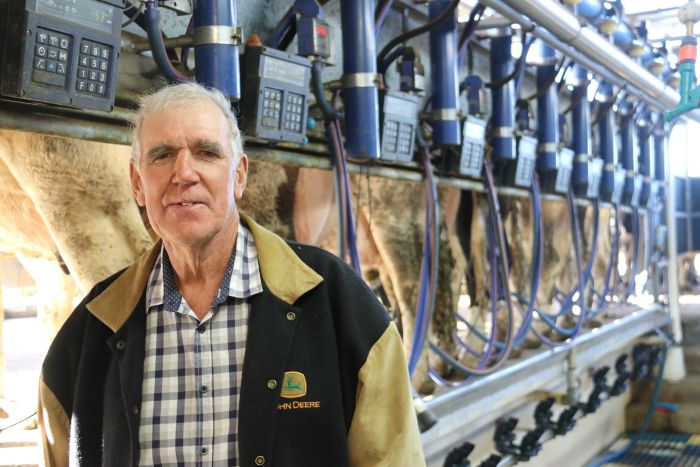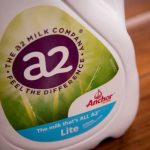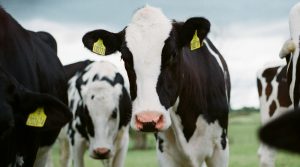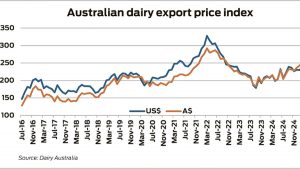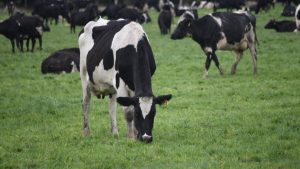
Dairy farmer losing money every day
David Janke, who milks 320 dairy cows near Toowoomba in southern Queensland, said it was disappointing last month’s extra 10 cents a litre did not go to farmers.
“Because if they’re saying they need to cover some of their costs now and make some profit, they haven’t worried the last eight years [selling dollar-a-litre milk as a loss-leader] and also they’re making millions of dollars of profit,” Mr Janke said.
“Farmers are losing money drastically every day of the week now and they’re keeping it just to make millions [of dollars] of profits.
“I’ve got farmers talking to me saying, ‘What’s going to happen? We haven’t got long left in the industry’.”
Mr Janke said last month when he pleaded for supermarkets to increase the price of milk, that if things did not improve, he himself would have to leave the industry by the end of the year.
A month on with no change, Mr Janke has begun selling some of his cattle.
“We’re using our silage to fatten heifers to go to Dinmore meatworks,” he said as tears rolled down his face.
“It’s an operation we’ve built over the years and now only because of the price we’re receiving we might have to walk away from it.”
Drought holding farmers back
The only thing that Mr Janke said could keep him going through this drought was a 40-cents-per-litre price increase at the farm gate, to help cover high feed costs.
“If milk prices come to what we’re suggesting [$1 per litre at the farm gate] we would be still be viable because thankfully there is a crop in Victoria and South Australia,” Mr Janke said.
“So even though we’ve still got high input costs, there is going to be fodder available and the price increase would allow us to buy that feed [without losing money].”
Mr Janke explained it was only this year because of the drought and high input costs that he had gone backwards financially.
‘Why is it so hard?’
Fellow Queensland dairy farmer Scott Priebbenow said he had 10 weeks of feed left for his cattle and if prices did not increase in that time, he would not be able to afford to buy in any more feed, forcing him to sell his herd.
“It’s pretty hard work getting out of bed and thinking, ‘Well, what happens after the few weeks of feed left and if you can source it, how do you actually pay for it’, because we’re just simply not getting enough money for our milk,” Mr Priebbenow said.
“Our costs are nearly a dollar a litre and we’re getting about 65 cents per litre and it just does your head in, especially when … consumers want to help us, everyone says we want to give you more for your milk,” he said.
“So why’s it so hard if people want to do it? Why?
“If we don’t get a price rise, a decent price, we’ll be out and we’ll be looking for a job.
“I’d have to get a whole heap of B-double [trucks] and all the cattle will have to go to Dinmore [meatworks], which will be just gut wrenching — it’s like selling your babies.
“But the simple thing is, give us the extra 40 cents [per litre at the farm gate] and there’s hay down south, we know we can source it, we just can’t afford it.”
Mr Priebbenow said supermarkets had proven it was simple to lift the price and pass the increase onto farmers.
“They did it in February,” he said.
“And if they can lift the price to help themselves out, then surely, they’ve got no problem with lifting the price to get us through.”
Where is the extra money going?
Coles, Woolworths and Aldi were contacted for interviews with the ABC but declined.
However all three companies provided statements to this question: Why is the extra 10 cent increase (from July) not going to farmers?
Woolworths said in its written statement:
“In February we were pleased to be the first national supermarket to transition away from $1 per litre fresh milk with the introduction of a nationwide 10 cent per litre levy on two and three litre Woolworths branded milk for dairy farmers,” it said.
“This extraordinary measure was designed to provide much needed confidence and immediate relief to dairy farmers given there had been little to no increase in farm gate prices for some time.
“The benefits of our February price change continue to flow through to more than 450 dairy farmers in full and we stand by this commitment.
“Since February we have seen farmgate prices increase significantly and they’re forecast to continue rising throughout the year.
“As a result of these farmgate price movements, we have been paying our suppliers even more for milk and other dairy products across the category over recent months.
“Due to these ongoing whole-of-market cost pressures, we have reviewed and adjusted the price of Woolworths milk.”
Aldi said:
“These price rises are the direct result of the recent increase in the farmgate milk prices agreed between our milk suppliers and the dairy farmers.
“We will continue to maintain the collection and distribution of 10 cents per litre implemented earlier this year and ensure that the proceeds are passed onto dairy farmers in full.
“We do not take price increases lightly, however these movements are necessary for building a long term sustainable Australian dairy industry.”
A spokesperson for Coles said in a written statement:
“Following a review of market conditions and rising cost pressures across the industry, Coles made the decision to increase the retail price of Coles Brand milk (in July).
“Coles has already accepted higher prices from milk suppliers.”
Minister wants increases for farmers
Federal Agriculture Minister Bridget McKenzie said she would like to see supermarkets pass on milk price increases to dairy farmers.
“It’s not OK [that supermarkets aren’t passing on the price increase], I want to see greater returns to the farm gate,” she said.
“Dairy farmers are doing it tough at the moment and to see our retailers choose not to pass on price rises is really, really tough in this environment.
“I was at Bangalara Dairies [in New South Wales] last week and met with a lot of producers … and I heard the importance of Norco as the big dairy cooperative, they [Norco] really led the charge and called the supermarkets out and got [a higher price].
“But it’s up now for the rest of the processors to actually have that conversation with the retailers on behalf of their suppliers.”
Moral obligation vs legal obligation
Mick Keogh, deputy chairman of the Australian Competition and Consumer Commission (ACCC), said supermarkets were doing anything wrong by not passing on price increases.
He said it was the processors that actually paid the farmer and negotiated prices with supermarkets.
“The mechanisms are there [for supermarkets to increase milk prices and pass that onto farmers] and it can happen as they have proven, but it’s obviously a commercial decision that those parties make — there are not competition issues that would elicit the interest of the ACCC,” he said.
Mr Keogh said supermarkets had no legal obligation to help Queensland dairy farmers through the drought, even if it meant saving the industry from collapse.
Mr Keogh said as part of the ACCC’s investigation into the dairy industry it examined 16 supply contracts between processors and supermarkets.
“All of them contained a farmgate milk pass through mechanism — so in other words — if the processor had to pay more at the farm gate to secure the volume of milk they needed for that contract — that was automatically passed through to the retailer in terms of the price they paid,” he said.
Are processors passing on price increases to farmers?
The ABC contacted three of the major dairy processors in Queensland and New South Wales to get comment on whether or not they are passing on price increases to farmers.
All three declined to be interviewed, but provided written statements.
A spokeswoman for Lion Dairy and Drinks said:
“Lion pays a competitive milk price to its suppliers across the various dairy regions we operate in, including New South Wales and Queensland.
“Our 2019/20 milk price indicates our continued confidence in each of the dairy regions we operate.
“In the regions where Lion Dairy is contracted to source and manufacture Retailer Own Brand white milk, if the relevant retailer has committed to pass price increases on to the dairy farmers supplying their milk, Lion Dairy & Drinks passes on those funds in full and will continue to.
“We understand that the drought conditions in the past 12 months have made it an extremely difficult season for our dairy suppliers.
“Even the most resilient individuals have been tested during this period and we appreciate the impact it has had on higher feed prices and on-farm profitability.
“Lion Dairy & Drinks is committed to working with all our dairy suppliers to minimise the impact of these conditions.
“That is why we have been proactive in responding to the challenges experienced in dairy production in Australia and have supported our dairy suppliers by [putting in place a number of drought programs, including] being the only major branded processor to introduce a wholesale price increase to support drought-affected dairy farmers in NSW, South East Queensland and Northern Victoria.
“This initiative ran for four months to January 31, 2019, and raised $3.487 million for Lion Dairy & Drinks’ suppliers in these regions.
“Where available, [we also] offer our farmers access to discounted feed such as brewers’ grain and citrus pulp, which is sourced from our brewing and juice operations.”
Dairy co-operative Norco declined an interview, however interim chief executive officer Greg McNamara offered a statement on Norco’s position.
“Norco is continuing to work with retailers and its customers to support farmers in these difficult drought circumstances,” he said.
He would make no further comment on any discussions with Coles on the pricing issue.
Lactalis Australia [formerly Parmalat] declined to comment on either the supermarket milk price or the price it is paying its suppliers.
‘We are prisoners and nobody cares’
The head of a collective bargaining group has criticised the major supermarkets for holding onto their recent price increases.
The Premium Milk Group represents about 150 Lactalis Australia suppliers in northern New South Wales and Queensland.
The French dairy giant holds contracts with Woolworths and Aldi to supply it with milk for its home brand range.
Premium Milk chairman Peter Jervis said he had been inundated with calls from farmers in the group desperate for that extra price increase.
“I’ve had more phone calls in the last month than I’ve had in the previous 12 years I’ve been on Premium because farmers are absolutely desperate, they’re hanging on by their fingernails,” he said.
“They want to stay in the business and they’re doing everything they can do it but no-one is listening to their cries.
“I know of farms who’ve drawn down on their superannuation funds and in some instances they’ve got a wife who’s teaching and they’ve drawn on her superfund to feed the cows.
“And I said to them, ‘Don’t do that because in the end you’ll end up with nothing because no-one cares’.
“We are prisoners in the sense that we’re locked in and nobody cares because the milk is on the shelf every day.
“I don’t blame the consumers because I think many of them would willingly pay more, but we don’t have the ability to get that.”
Mr Jervis said that the Premium Milk Group contract with Lactalis expires on December 31, 2019 and he understood Lactalis’ contract with Woolworths for its home brand milk expired on August 31, 2019.
“We are seeking a substantial increase in returns to the farmer because costs have escalated to such a degree that’s very difficult, well it’s nigh on impossible, to stay in the black,” he said.
Consumers presumed milk price increase was for farmers
While none of the three major supermarkets promised the price increase in July would be passed on to farmers, many consumers presumed it would be because the increase earlier in the year was.
Lorna from Toowoomba told the ABC she was “extremely disappointed” that supermarkets were not passing on the increase to farmers.
“I’m happy to pay the extra if I knew it was going to the farmers,” she said.
“They need that extra money so they can provide everyone with these products.
“We need to support our farmers no matter what. We don’t want to be buying long life milk … we want the fresh stuff.”
Queensland beef producer Gavin said he thought the price increase was for farmers.
“I hope it is getting to the farm gate,” he said.
“I’d pay more than double what I’m paying now to support the farmers.”
Darryl, a resident in Toowoomba, said he would also happily pay more to help farmers through the drought.
“They [supermarkets] told us it’s going to the drought, so the increase should all go to the farmers,” he said.
“The price doesn’t really bother me if you know it’s going to help farmers in the drought.”
